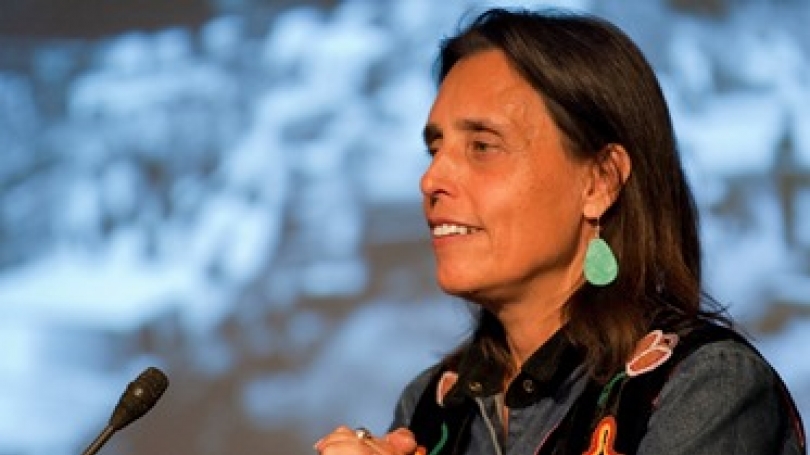
Phanem-anon: Celebrating Indigenous Women and Leadership - May 4-5
Phanem-anon: Celebrating Indigenous Women and Leadership - May 4-5
Click on a Name Below to View the Video.
- Jennifer Nez Denetdale (Diné) – Indigenous Leadership and Gender in the 21st Century
- Mililani Trask (Kanaka Oiwi) – Women’s Involvement in Hawaiian Politics
- Ellen Gabriel (Mohawk) – Indigenous Human Rights in an Era of Decolonization
- Winona LaDuke (Ojibwe) – Indigenous Women and the Environment: DAPS and Keystone XL
We invite the Dartmouth community and the public to join in the conversation with Jennifer Rose Denetdale (dine), Winona LaDuke (Ojibwe), Mililani Trask (Kanaka Oiwi), and Ellen Gabriel (Mohawk). Their involvement in indigenous resistance movements include DAPL, the Keystone XL Pipeline, Indigenous gender issues, Treaty rights, history, the United Nations Declaration of Rights of Indigenous peoples, and more. Please join the Native American community at Dartmouth in welcoming these extraordinary women, while engaging in opportunities to bring awareness to prominent indigenous issues.
Thursday May 4 – Steele 006
2:00-3:30 Indigenous Leadership and Gender in the 21st Century
Jennifer Nez Denetdale (Diné) is a historian and scholar of Indigenous Studies, she specializes in theories of colonization and decolonization, Native women & feminisms, and critical Indigenous Studies. She is an associate professor of American Studies at the University of New Mexico. Professor Denetdale is the author of Reclaiming Diné History: The Legacies of Chief Manuelito and Juanita (Univ. of Ariz. Press, 2007), two Navajo histories for young adults, and numerous articles and essays. She has been recognized for her scholarship and service to her nation and community with several awards.
4:00-5:30 Women’s Involvement in Hawaiian Politics
Mililani Trask (Kanaka Oiwi) is a Native Hawaiian political speaker, attorney, and champion of indigenous and human rights. During the Hawaiian sovereignty movement in the 1980s, Trask founded Ka Lahui Hawaii, a Native Hawaiian initiative for self governance. She worked as a diplomat and has testified multiple times at the United Nations, advocating for the passage of the UN Declaration on the Rights of Indigenous Peoples. She remains prominent in Native Hawaiian politics, and currently serves as an advisor to Innovations Development Group, a firm focused on bringing clean, renewable, energy to Hawaiian communities.
Friday May 5 – Dartmouth 105
2:00 – 3:30 Indigenous Human Rights in an Era of Decolonization
Ellen Gabriel (Mohawk) is revered for her work as an activist in defending the individual and collective rights of aboriginal people in Canada. Gabriel is most known for her involvement in the dispute between the People of the Longhouse, her community (Kanehsatà:ke) and the Canadian government; when she was chosen to be the official spokesperson during the 1990 Oka Crisis. Gabriel has travelled internationally to Japan, France, Holland, and Strasbourg to educate people about indigenous human rights. She has also participated at various international forums and negotiations.
4:00 – 5:30 Indigenous Women and the Environment: DAPL and Keystone XL
Winona LaDuke (Ojibwe) is a well known environmentalist, economist, writer, and leader. She founded the White Earth Land Recovery Project in 1989, focused on buying back traditional lands from non-Natives for indigenous sustainable development. In 1993, she founded Honor The Earth, an organization which seeks to create awareness and support for indigenous environmental issues, Native development, art, and policy. Honor The Earth and LaDuke were centrally involved at Standing Rock, using media to garner large support against the Dakota Access Pipeline.
Sponsored by: Native American Studies Program, Office of the Provost, Environmental Studies Program, the John Sloan Dickey Center for International Understanding, the Office of Sustainability, Porter Family Fund for Sustainability in the Curriculum, Office of Residential Life and the Living Learning Communities, Native American Program, and the First Year Student Enrichment Program